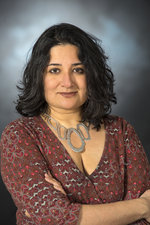非常抱歉,
你要访问的页面不存在,
非常抱歉,
你要访问的页面不存在,
非常抱歉,
你要访问的页面不存在,
验证码:

职称:professor
所属学校:University of Minnesota-Twin Cities
所属院系:Science and Technology
所属专业:Science Technologies/Technicians, Other
联系方式:612-624-0363
My first book Beyond Bollywood (Routledge 2004) demonstrates the centrality of cinema to the formation of South Asian diasporas in North America and Britain. Through analyses of the production, circulation, and reception of diasporic films, I theorize the gender, sexual, and racial formations of diaspora. My research on the globalizing of Bollywood attends to the rise of Bollywood since economic liberalization in India, the corresponding formation and development of new genres such as NRI or Non-Resident Indian films, the transnational circulation and reception of popular Hindi films within diasporas, and the fluid and heterogeneous relationships between Bollywood and its audiences. I move beyond textual analysis of what diaspora means in the films, to understand what the films do in diaspora, i.e., to analyze the presence, function, and influence of Bollywood in diaspora. Additionally, my scholarship focuses on Asian American racial formations and citizenship in post-9/11 America. I examine how certain figures – e.g., (South) Asian American men – are framed as perpetrators of violence and terror to establish and justify the expansion of empire and the security state in the name of protecting of the vulnerable citizen. The essays explore the convergence and conflation of violence, race, and masculinity within media in discussions of Seung-hui Cho at Virginia Tech, the Harold and Kumar film series (in progress), and Tyler Clementi and Dharun Ravi at Rutgers (in progress). Asian Americans in Dixie brings together essays on historical and contemporary migration, community formation, and racialization in the South to reflect the breadth and depth of the Asian American presence in the region. With the emergence and rise of “brain sciences” (psychology, cognitive science, and neuroscience), a new set of neural knowledge and technologies (e.g. neuroimaging) is transforming how we identify, understand, and manage personhood and citizenship vis-a-vis conceptions of “normal” and “abnormal” brains. Queer and disability studies have elucidated how “normal” bodies and minds are defined and have demonstrated how “deviance” from these norms marks an abject status by characterizing some individuals as sub-human, bestowing on them a diminished citizenship. By interrogating the proliferation of neural knowledge and how it is intrinsically and increasingly related to the governance of the self, my new research examines how neural knowledge about autism shapes our social, political, and material worlds nationally and transnationally. Consequently, the project raises questions about the meaning of autism and about the ways neural knowledge and neuro-normativity (e.g., the hegemony of "normal brains and cognition") increasingly form and inform societies and citizenship in the new millennium.
Chair: 2013 - 2016 Director of Undergraduate Studies: 2010 - 2013 Visiting Associate Professor: Harvard University , Spring 2009 Director of Asian American Studies Program : 2006 - 2008